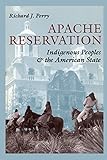Apache Reservation : Indigenous Peoples and the American State / Richard J. Perry.
Material type: TextPublisher: Austin : University of Texas Press, [2021]Copyright date: ©1993Description: 1 online resource (276 p.)Content type:
TextPublisher: Austin : University of Texas Press, [2021]Copyright date: ©1993Description: 1 online resource (276 p.)Content type: - 9780292762732
- 973/.04972 20
- online - DeGruyter
| Item type | Current library | Call number | URL | Status | Notes | Barcode | |
|---|---|---|---|---|---|---|---|
 eBook
eBook
|
Biblioteca "Angelicum" Pont. Univ. S.Tommaso d'Aquino Nuvola online | online - DeGruyter (Browse shelf(Opens below)) | Online access | Not for loan (Accesso limitato) | Accesso per gli utenti autorizzati / Access for authorized users | (dgr)9780292762732 |
Frontmatter -- Contents -- Preface -- CHAPTER 1 The Reservation -- CHAPTER 2 Apache Origins: The Subarctic Base and the Odyssey to the Southwest -- CHAPTER 3 The Apache and the Spanish State -- CHAPTER 4 The Apache in the Nineteenth Century -- CHAPTER 5 The Apache and the American State -- CHAPTER 6 San Carlos after Mid-century -- CHAPTER 7 Political Economy in San Carlos -- CHAPTER 8 Trajectories and Trends -- References Cited -- Index
restricted access online access with authorization star
http://purl.org/coar/access_right/c_16ec
"Indian reservations" were the United States' ultimate solution to the "problem" of what to do with native peoples who already occupied the western lands that Anglo settlers wanted. In this broadly inclusive study, Richard J. Perry considers the historical development of the reservation system and its contemporary relationship to the American state, with comparisons to similar phenomena in Canada, Australia, and South Africa. The San Carlos Apache Reservation of Arizona provides the lens through which Perry views reservation issues. One of the oldest and largest reservations, its location in a minerals- and metals-rich area has often brought it into conflict with powerful private and governmental interests. Indeed, Perry argues that the reservation system is best understood in terms of competition for resources among interest groups through time within the hegemony of the state. He asserts that full control over their resources—and hence, over their lives—would address many of the Apache's contemporary economic problems.
Mode of access: Internet via World Wide Web.
In English.
Description based on online resource; title from PDF title page (publisher's Web site, viewed 26. Apr 2022)


